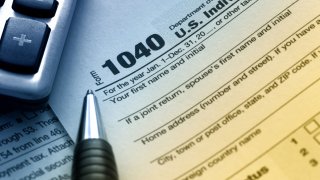
The latest updates to the $1.9 trillion federal coronavirus relief package could save millions of people from a surprise tax bill.
The Senate on Saturday passed a version of the Covid relief package that is slightly different than the one passed by the House. Senate Democrats agreed to lower additional unemployment aid to $300 per week from $400 but extended the payments through Sept. 6.
They also included a provision to waive taxes on the first $10,200 in unemployment income for those who made less than $150,000 in adjusted gross income in 2020.
Making the first $10,200 of unemployment insurance income untaxable is aimed at keeping families from being hit with a surprise tax bill at a difficult time for many. In 2020, roughly 40 million Americans collected unemployment insurance benefits, according to a February research paper written by Brian Galle and Elizabeth Pancotti for The Century Foundation.
More from Invest in You:
Lost jobs, no child care: A year into the pandemic, women are not OK
The IRS got 35 million tax returns in one week as Americans race to file
Smallest businesses getting extra PPP help. What to know before applying
"Partial tax forgiveness will ensure that millions of Americans don't have to mail their relief checks back to the IRS, and can instead put food on the table, refill prescriptions and pay the rent," said Pancotti, who is a policy director at Employ America.
Those benefits — including the additional weekly $600 of Federal Pandemic Unemployment Compensation and the extra $300 weekly through the Lost Wages Assistance program — are considered taxable income. People receiving unemployment can opt to have 10% of benefits withheld to cover the federal tax liability, but fewer than 40% of recipients appear to have done so in 2020, according to the paper.
Money Report
In addition, some states did not offer workers receiving unemployment benefits through CARES Act programs the option to withhold a portion of the income for taxes.
Who the bill will help
On average, the provision in the latest stimulus bill will reduce up to $1,020 in tax liabilities, either increasing people's refunds or lowering the amount that they owe, according to Pancotti. This could amount to even more for people in higher tax brackets, she said.
Of course, those who had more than $10,200 in unemployment income in 2020 will still be taxed on the remainder of the benefits. This could result in a tax bill for some, depending on how much total income they had in total in 2020.
For example, if an individual had about $20,000 in unemployment benefits in 2020, and that was their only source of income for the year, the first $10,200 would be exempt from taxation, according to Richard Auxier, senior policy associate in the Urban-Brookings Tax Policy Center.
The remaining $9,800 would be taxable, but the person would also be subject to the $12,000 standard deduction and likely wouldn't owe any tax, he said.
But, if another individual had the same amount of unemployment income but also worked for part of the year, they might end up paying some tax on their benefits, depending on the rest of their situation.
"All the other parts of the tax system kick in," said Auxier, adding that eligibility for other credits such as the earned income tax credit or child tax credit could change how much one would owe.
This means that the benefit will be most helpful for middle-class households, or those that had high enough income in 2020 to owe taxes on unemployment insurance, according to Kyle Pomerleau, a resident fellow at the American Enterprise Institute.
What to know about taxes if you got unemployment
To be sure, there is still some time before the Covid stimulus bill becomes law. The House plans to vote on the legislation again on Tuesday and then send it to President Joe Biden to sign.
Even once that happens, however, it will take some time for the IRS and Treasury Department, as well as tax preparers and companies, to implement and give guidance on the new rules.
This means that if you had unemployment income in 2020, it's best to wait to submit your tax return to the IRS, even though it's already the middle of the filing season. It also means that if you already filed for 2020, you will need to send in an amended return but should also wait to do that until the bill is law.
Correction: Additional unemployment benefits will be extended through Sept. 6. An incorrect date was included in an earlier version of this article.
SIGN UP: Money 101 is an 8-week learning course to financial freedom, delivered weekly to your inbox.
CHECK OUT: Single mom earns $10,000/month on Outschool: 'I would have never been able to make as much money as a regular teacher' via Grow with Acorns+CNBC.
Disclosure: NBCUniversal and Comcast Ventures are investors in Acorns.






